- Home
- Terry C. Johnston
Ride the Moon Down tb-7 Page 3
Ride the Moon Down tb-7 Read online
Page 3
Looking down at himself again, Titus had to agree. His legs might see the sun only once a year, come his annual rendezvous scrubbing. From his neck up and his wrists down, the man was tanned brown as a twice-smoked Kentucky ham. But the rest of his skinny, scarred, bony body was about as pale as a translucent winter moon.
“Downright stupefying, ain’t I?” he said in English as he worked at scrubbing that second leg before settling back into the stream.
Waits had finished pulling off all the fouled grass and moss she had packed around the baby’s genitals at sundown the night before, and now held the girl just above the surface of the water to gently wash the child’s skin. Finally she laid the infant back on the blankets, patted the child dry, then leaned over to yank up long blades of summer-cured grass from the bank. These clumps of dry stalks she placed under the girl’s bottom, packed them between the child’s legs, then methodically rewrapped the long sections of cloth and, finally, an antelope hide around her daughter’s body.
Once done with that, Waits-by-the-Water returned the bundled child to the open flaps of the small cradleboard as the girl began to fuss. Watching her care for their child there on the bank, Titus smiled, enjoying the round fullness of her rump as it strained against her leather dress, the way her full breasts swayed against the buckskin yoke as she knotted the cradleboard strings.
“You coming, woman?”
Picking up the cradleboard, then settling cross-legged on the bank, Waits pulled aside the loose dress sleeve and partially exposed a breast, guiding it into the girl’s mouth. “As soon as she has eaten some more breakfast.”
“By the stars, woman—that child eats more than … more than—”
“More than you?” she interrupted with a big grin.
He slapped at the water with one hand. “Seems she’s eating most all the time.”
“That’s what babies do, husband. They eat and sleep, and mess their cradleboards too.” She looked at him a long moment, then gazed up- and downstream before she added, “As soon as she is asleep, I’ll join you. If no one will see me, I will come in to swim with you.”
That delicious anticipation was enough to slowly arouse him.
Once she had set the cradleboard aside to let the child sleep with her full tummy, Waits quickly yanked off her moccasins. Taking a moment to glance both ways along the creek, she hurriedly pulled her dress over her head and stepped off the bank, sucking in a gush of air as the sudden cold shocked her.
“You’ll get used to it. Come on over here,” he begged.
She settled beside him, then turned so that he could pull her back against his chest. There they sat in the middle of the creek as the valley gradually came alive on all sides of them. In the quiet of this early morning, it took little effort to hear sounds drifting from far-off trapper camps and Indian villages too: grumbling, hungover men, mothers scolding children in foreign tongues, the whinnying of horses and braying of mules, the crack of axes and the occasional boom of a rifle against the far bluffs where someone had gone in search of game.
Time was he had never seen a rendezvous sunrise unless he was stumbling back to his robes after a long, long night of liquoring and devilment. Many were the summers he drank himself into oblivion, hardly rousing from his stupor to vomit right where he lay, then passing right out again—repeatedly convincing himself he was having a fine time of it. After all, weren’t the rest of his friends doing the very same thing, day after day until the rendezvous was over and the traders headed east, or at least until he and his friends ran out of money and pelts and it was time to face down their hangovers, time to haul their aching heads back to the high country where they would work up enough plews to pay for another summer spree?
The last real drunk he’d given himself was no more than two summers before, back to Pierre’s Hole in thirty-two. By then the hangovers had begun to hurt him something terrible. And last year both he and Josiah took it easy on the whiskey, choosing not to punish the barleycorn that much, what with their both having new wives with them.
Wives. Most white folks just wouldn’t ever understand, he figured. There’d been no ceremony between him and Waits-by-the-Water. Hell, when he’d ridden off for the western sea more than a year and a half ago, Titus had gone to sulking and licking his wounds, figuring her vows of love weren’t worth much at all. But come the next spring—there she had been, tagging along with Josiah his own self, clearly intending to find Titus, to show him just how devoted she truly was.
No, there had been no civil-folks preacher to say the proper words over the two of them as they stood before their families and friends as they did back among the settlements. Such folks in the States would likely mule up their eyes and scrunch their lips in a sneer at the very thought that a man like him and a creature such as Waits could be so much in love that they would privately vow to one another every bit as strong as any white folks’ ceremony, promising they would be there until death ultimately parted them.
One more reason why he figured he’d made his last trip back east. St. Louis was in the past, and all those white folks too. Titus figured he wouldn’t live long enough to ever want to see settlements again, their sprawl stretching farther and farther west the way they always had.
Maybe he wouldn’t live long enough to see settlers and wagons, white women and preachers, reach the high plains, much less make it to the Shining Mountains. Why—a mountain man sure as hell ought’n die a’fore he had to witness such a goddamned confabulation as that! Damn if it wouldn’t likely pull the heart right out of a feller to see all this get ruin’t with settlers and civilizing.
By bloody damn, he prayed there’d still be plenty of wild in the wilderness, enough to last him all the rest of his days.
“You are going to see your tall friend this morning?” Waits asked him in a whisper as she gently scrubbed his grimy fingers one by one, scratching at the layers of grease and blood, grit and camp-black that had encrusted itself down deep into every knuckle, hardened into dark crescents at the base of every fingernail.
“Yes. Jarrell,” he said in English.
“Jer-rel,” she repeated.
“Jarrell Thornbrugh,” he completed the friend’s name with just the proper burr to the last name. “A John Bull Englishman.”
“That is more of his name?”
He chuckled and explained in Crow, “Just Jarrel Thornbrugh. Englishman is where he’s from, what he is. Like I’m American from the States, and you’re a Crow from Absaroka.”
“It was good to have a friend near when death loomed close last summer,”* she reflected.
“He saved our lives,” Bass agreed. “Saved Josiah’s life. Mine too.”
“This man, he comes to trade his furs like you?”
“No. Last summer Jarrell told me that his boss, a man I met out to the western sea, sent him to rendezvous all alone only to look things over. That boss, a white-headed eagle named McLoughlin, had plans to send a brigade of men here this summer.”
“More of the English white men?”
“Yes, woman—all sent by a man who wants to carve off a piece of this rendezvous trade for himself.”
Worry tinged her voice. “Will the English push the Americans out of these mountains?”
Bass snorted, shaking his long, damp hair. “Not a chance of that. If the English know what’s good for them, they’ll stay to their own country and leave this to the rest of us.”
“You will go this morning to throw the tall white man out of this country?”
After some hesitation Bass said, “I don’t figure I got the right to throw any man out of what country isn’t mine.”
“But many times you’ve told me this land is your home.”
“True, woman. But it still isn’t mine, the way folks put down claims on the ground back east. No, I’m content to live out here where none of this is really mine, to pass on through a lot of country where I’m only visiting.”
“There is Crow country farther north,” she trie
d to explain as she wrapped his arms over the tops of her heavy breasts. “And this country is the land of the Shoshone and Bannock. All fight to keep the powerful Blackfoot from taking away their lands. So why aren’t you going to fight the English now that they have come to take this country from you?”
“I don’t think they have come here to take any land from me,” he declared.
“But they came for the beaver,” she maintained. “And some of that beaver is yours.”
He leaned to the side so he could gaze closely at her face. “You trying to stir up some trouble between me and that big Englishman?”
With a smile she replied in Crow, “No. I am only trying to make sense of why you do what you do sometimes. Make sense of what you don’t do at times. You Americans and the Englishmen are confusing to me: you say you don’t want this country out here, but you both want to be free to take what you want from the land.”
Beginning to fuss, the child began a muted squawl from the bank.
“You’re right, woman,” Bass admitted. “This land ain’t mine, but the beaver I take with my own sweat, with my hands—they’re mine. I don’t allow I have any right to fight for this country because it’s not mine. But I will fight for what is mine: my beaver, my animals and traps, my family. No man will ever take them from me.”
She turned slightly and kissed him, then pulled away, wading to the bank. He stood too, allowing the water to sluice off his cold white flesh, marveling at just how pale he was now that the sun had climbed fully above the ridge to the east.
As she pulled her dress over her head and tugged it down over her hips, Waits-by-the-Water laughed again. “I am happy a strange fish like you is the father of my child.”
“Even if you don’t understand me at times?”
The woman nodded, dragging the cradleboard into her lap and stroking the infant’s cheek with a fingertip. “I may not always understand the way things rumble around inside your head, husband. But I always know just how your heart works.”
“Is that the back of Jarrell Thornbrugh’s head I’ve got my pistol pointed at?”
At first the tall Englishman froze, daring not to turn his head, his eyes instead glancing at the other company employees nearby, hoping to find them ready to defend him.
“And you’re the booshway of this here bloody Hudson’s Bay bunch, ain’cha?”
With his pounding heart rising to his throat and his hands held out from his body, Thornbrugh turned just enough to level his eyes at his antagonizer.
Plain to see that the man had no pistol trained on the back of his head.
Jarrell’s eyes climbed to the stranger’s face.
“By the stars! It can’t be!” Thornbrugh roared as he whirled around, his booming voice like the clangor on a huge cast-iron bell.
Bass slapped both his open hands on his chest, then spread his arms wide. “In the flesh, you god-blame-ed Englishman!”
They crashed together, hugging fiercely, slapping backs and shoulders, dancing side to side and around and around.
“I’ve asked after you,” Thornbrugh admitted breathlessly as they ground to a halt, their forearms locked fraternally. “No one heard evidence of you since last summer on the Green. No one’s come across you in their travels.”
“I stayed south ever since ronnyvoo,” Bass explained. “And I went east for a time too.”
“The States?” and Jarrell rocked back a bit, closely studying his friend’s face. “You didn’t think of giving up the mountains?”
“Hell, I couldn’t give up the mountains,” he declared with a reassuring smile. “Wouldn’t be happy anyplace else.”
Then he spotted the left eye and leaned close to have himself a look at it. “So tell me about this eye of yours.”
“Don’t rightly know what to think of it, Jarrell. Just come on me few months back. Been seeing stars shootin’ out of it for some time, howsoever. But this last spring it got so ever’thing’s real fuzzy.”
He peered closely at the milky film over the iris and pupil. “Looks cloudy. You see anything with it?”
“A little,” Bass answered. “I can tell light from dark. Not much else. For most part, I ain’t in a bad way, what with this other eye doing more’n its share.”
“Tie your horse off and come on in here, you old one-eyed reprobate,” he said with relief, gesturing for Titus to follow him beneath the canvas sheeting Thornbrugh’s men had strung up for shade in the middle of their encampment.
He watched the American ground-hobble his animal where it could graze nearby, then patted the blanket beside him. “Sit.”
“You John Bulls got any tobaccy wuth smoking?” Bass inquired.
“Get me some tobacco for this guest with such terrible manners,” Thornbrugh roared, laughing.
As the American filled his pipe, Jarrell said, “As soon as I arrived here, I asked after you. But as the days slipped past, I feared more and more you’d lost your hair.”
“Wagh! If’n that half-breed giant named Sharpe couldn’t raise this nigger’s hair last summer, ain’t a Injun gonna take what’s left of this poor scalp!”
He slapped Bass on the leg, sensing such an exquisite joy in seeing this friend after a long, long year of separation. “You’ve brought many pelts to trade?”
“Nope, I ain’t got but a few left to barter off.”
“Not a good year for you and young Paddock?”
The American smiled. “It was a damn fine year for the two of us, Jarrell. But I left most all of them plews behind in Taos with Josiah.”
“Taos,” he repeated, confused. “Josiah’s not here with you?”
Having puffed on his pipe to get it started with a twig from the nearby fire, Titus Bass began to tell the story of all that had taken place since last summer’s raucous trading fair. From that chase after an old Shoshone friend turned horse thief, through their deadly hunt for an Arapaho war party in the Bayou Salade, on to those Christmas and New Year’s celebrations in the little village of San Fernando de Taos, where Scratch had run onto an old friend believed dead. A chance meeting that spurred Scratch all the way back to St. Louis through the maw of winter, then off to the west again for the massive mud fort the Bent brothers had erected beside the Arkansas River—completing that deadly journey in hopes of putting some old ghosts to rest.
“This Silas Cooper shot you?”
The American tugged up the hem of his cloth shirt to show the vividly pink bullet wounds.
A dark-skinned stranger stepped beneath the shady bower, leaning in to inspect one of the puckers as he commented, “You got nothing better to do, Jarrell—but go and look at this man’s bullet holes?”
Thornbrugh snorted, “By the stars, the bullet made that wound came a hairsbreadth from killing my friend here. Introduce yourself proper, Thomas.”
“Thomas McKay,” the man declared, holding his hand out as he backed a step.
Watching the American grab McKay’s hand, Jarrell explained, “This be Titus Bass—”
“Yes, I’ve heard of you,” McKay replied, his dark Indian eyes narrowing. “You come to Vancouver to visit the Doctor.”
“Two winters back it was,” Bass stated. “A good man, the Doctor. He is what you see of him.”
“Thomas here is leading the Doctor’s brigade this year,” Thornbrugh explained.
“We ain’t been doing much in the way of trading,” McKay confessed as he took a dipper of water from one of the company’s laborers and drank. Wiping the dribble from his chin, he said, “But we didn’t figure to scare up much trading from you Americans anyway.”
Bass looked at Thornbrugh. “Company men bound to deal with their own traders. Them what trap for American Fur gonna trade for company supplies. And Rocky Mountain Fur gotta trade with Sublette.”
“Last year them Rocky Mountain Fur partners had contracted with that Yank named Wyeth to buy supplies off him this summer,” McKay said. “But Sublette come in a couple days ahead of Wyeth, so Fitzpatrick started trading o
ff pelts even before Wyeth got to the valley.”
Thornbrugh wagged his head. “So now Wyeth has all those goods Rocky Mountain Fur said they’d take off his hands, with no one to trade with.”
“How ’bout the free men?” Bass inquired. “Where they been trading their furs?”
Jarrell could tell by the set of Scratch’s jaw that the unfairness of Sublette’s actions didn’t sit well with his American friend. “Sadly, from what I have been witness to myself, it appears most of your American free men are conducting their business with Sublette.”
“Damn ’em,” Bass growled, his brow furrowing. “But it don’t s’prise me none. Most of ’em knowed Sublette for years now. Some trapped with him back when, or they been trading with him for the last few ronnyvooz. Natural, I s’pose, for ’em to stick with what they know. But it damn well sours my milk to see a man break his vow with another, like Fitz and the rest done to Wyeth.”
“Is there no honor among you Americans?” McKay inquired with a wry grin.
“Not when you’re speaking of prime pelts and beaver country,” Bass confessed. “For years now there’s been a war on between Rocky Mountain Fur and Astor’s company.”
“From what I’ve learned over the past few days,” Thornbrugh injected, “no longer is there any war between them. Instead, they’ve divided up the fur country on the east side of the mountains.”
Bass bellowed, “Divided it between ’em!”
Finally settling on the ground beside Thornbrugh, McKay declared, “Astor’s retired and turned his business on the upper Missouri over to Pierre Chouteau in St. Louis—so that Upper Missouri Outfit’s gonna run things up there from here on out.”
“They’ll have that country all to themselves now that Sublette and Campbell are pulling out,” Thornbrugh continued. “In turn, American Fur won’t give Sublette’s company any competition for a year down here in these central and southern mountains.”
Bass wagged his head as if it was incomprehensible to him. “They made ’em a truce? Dividing up the beaver country a’tween ’em … and here it was not so long ago the free men were hoping McKenzie would come on down here from his American Fur post to give Sublette some competition—his prices were so goddamned high!”

 Black Sun, The Battle of Summit Springs, 1869
Black Sun, The Battle of Summit Springs, 1869 Lay the Mountains Low
Lay the Mountains Low Black Sun: The Battle of Summit Springs, 1869 (The Plainsmen Series)
Black Sun: The Battle of Summit Springs, 1869 (The Plainsmen Series)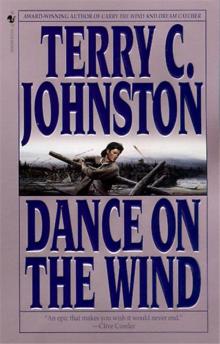 Dance on the Wind tb-1
Dance on the Wind tb-1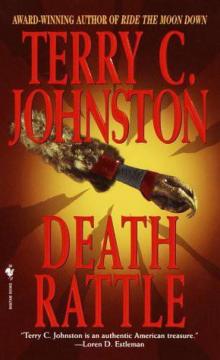 Death Rattle tb-8
Death Rattle tb-8 The Stalkers
The Stalkers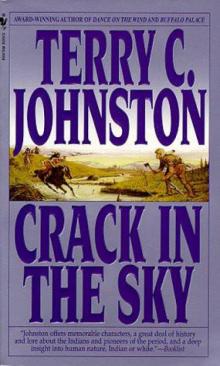 Crack in the Sky tb-3
Crack in the Sky tb-3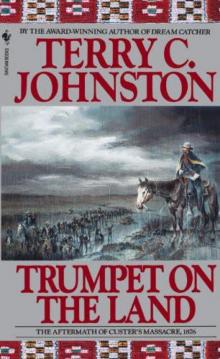 Trumpet on the Land: The Aftermath of Custer's Massacre, 1876 tp-10
Trumpet on the Land: The Aftermath of Custer's Massacre, 1876 tp-10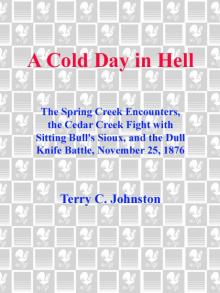 A Cold Day in Hell
A Cold Day in Hell Long Winter Gone: Son of the Plains - Volume 1
Long Winter Gone: Son of the Plains - Volume 1 Buffalo Palace
Buffalo Palace Cries from the Earth
Cries from the Earth Death Rattle
Death Rattle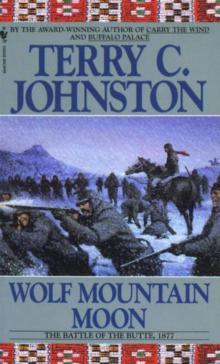 Wolf Mountain Moon: The Battle of the Butte, 1877 tp-12
Wolf Mountain Moon: The Battle of the Butte, 1877 tp-12 Crack in the Sky
Crack in the Sky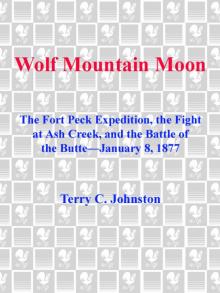 Wolf Mountain Moon
Wolf Mountain Moon Turn the Stars Upside Down: The Last Days and Tragic Death of Crazy Horse
Turn the Stars Upside Down: The Last Days and Tragic Death of Crazy Horse Winter Rain
Winter Rain Shadow Riders: The Southern Plains Uprising, 1873 (The Plainsmen Series)
Shadow Riders: The Southern Plains Uprising, 1873 (The Plainsmen Series)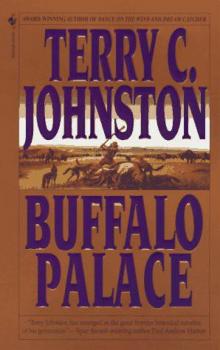 Buffalo Palace tb-2
Buffalo Palace tb-2 Cries from the Earth: The Outbreak Of the Nez Perce War and the Battle of White Bird Canyon June 17, 1877 (The Plainsmen Series)
Cries from the Earth: The Outbreak Of the Nez Perce War and the Battle of White Bird Canyon June 17, 1877 (The Plainsmen Series) Shadow Riders, The Southern Plains Uprising, 1873
Shadow Riders, The Southern Plains Uprising, 1873 Ashes of Heaven (The Plainsmen Series)
Ashes of Heaven (The Plainsmen Series) Ashes of Heaven
Ashes of Heaven Devil's Backbone: The Modoc War, 1872-3
Devil's Backbone: The Modoc War, 1872-3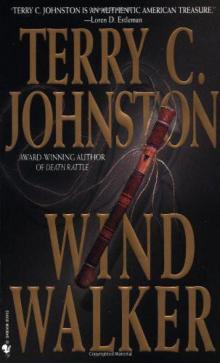 Wind Walker tb-9
Wind Walker tb-9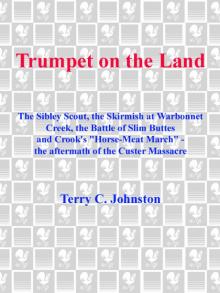 Trumpet on the Land
Trumpet on the Land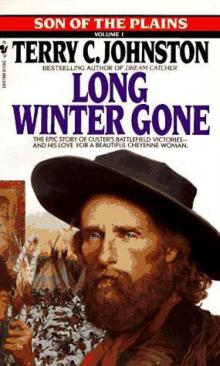 Long Winter Gone sotp-1
Long Winter Gone sotp-1 Dying Thunder
Dying Thunder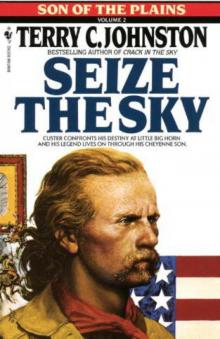 Seize the Sky sotp-2
Seize the Sky sotp-2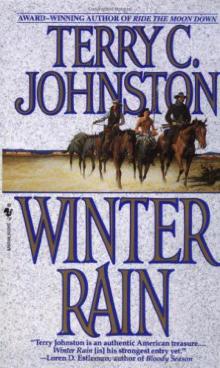 Winter Rain jh-2
Winter Rain jh-2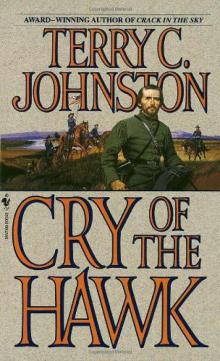 Cry of the Hawk jh-1
Cry of the Hawk jh-1 Sioux Dawn, The Fetterman Massacre, 1866
Sioux Dawn, The Fetterman Massacre, 1866 Sioux Dawn: The Fetterman Massacre, 1866 (The Plainsmen Series)
Sioux Dawn: The Fetterman Massacre, 1866 (The Plainsmen Series) Ride the Moon Down
Ride the Moon Down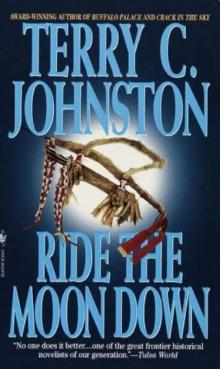 Ride the Moon Down tb-7
Ride the Moon Down tb-7 Red Cloud's Revenge
Red Cloud's Revenge Wind Walker
Wind Walker